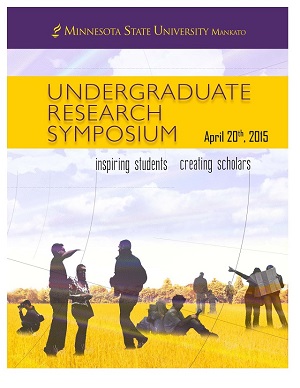Faculty Assessment Practices for Academic Integrity
Location
CSU Ballroom
Start Date
20-4-2015 2:00 PM
End Date
20-4-2015 3:30 PM
Student's Major
Psychology
Student's College
Social and Behavioral Sciences
Mentor's Name
Kathy Bertsch
Mentor's Email Address
kathy.bertsch@mnsu.edu
Mentor's Department
Psychology
Mentor's College
Social and Behavioral Sciences
Second Mentor's Name
Marissa Hamilton
Second Mentor's Department
Psychology
Second Mentor's College
Social and Behavioral Sciences
Description
Academic dishonesty is a major problem with students who partake in online courses. Students who participate in online courses tend to take the easy way out and it is unclear the degree to which faculty actively take steps to inhibit online academic dishonesty. Online academic dishonesty emphasizes a need for faculty to learn how to inhibit these practices. Evidence shows that academic dishonesty can be caused by lack of face-to-face contact between student and instructor. Research shows that faculty are most concerned with online cheating and dishonesty when they are not familiar with technology and have no previous experience with online learning prior to teaching an online course. Additionally, some research shows faculty who teach full online courses do not believe that there is a difference between academic dishonesty during classroom courses compared to online courses, while faculty who have experience teaching hybrid courses, admit to knowing that cheating may be occurring. This study will survey Minnesota State University-Mankato faculty on their knowledge and methods of inhibiting academic dishonesty during online assessments. Faculty will identify their current practices in inhibiting cheating during online examinations. Results of this survey provide evidence suggesting areas of continued professional development for faculty teaching courses with online components. Inhibiting academic dishonesty in online courses is important to higher education as more courses are taught online, taught in a hybrid fashion or taught with support of an online course management system.
Faculty Assessment Practices for Academic Integrity
CSU Ballroom
Academic dishonesty is a major problem with students who partake in online courses. Students who participate in online courses tend to take the easy way out and it is unclear the degree to which faculty actively take steps to inhibit online academic dishonesty. Online academic dishonesty emphasizes a need for faculty to learn how to inhibit these practices. Evidence shows that academic dishonesty can be caused by lack of face-to-face contact between student and instructor. Research shows that faculty are most concerned with online cheating and dishonesty when they are not familiar with technology and have no previous experience with online learning prior to teaching an online course. Additionally, some research shows faculty who teach full online courses do not believe that there is a difference between academic dishonesty during classroom courses compared to online courses, while faculty who have experience teaching hybrid courses, admit to knowing that cheating may be occurring. This study will survey Minnesota State University-Mankato faculty on their knowledge and methods of inhibiting academic dishonesty during online assessments. Faculty will identify their current practices in inhibiting cheating during online examinations. Results of this survey provide evidence suggesting areas of continued professional development for faculty teaching courses with online components. Inhibiting academic dishonesty in online courses is important to higher education as more courses are taught online, taught in a hybrid fashion or taught with support of an online course management system.
Recommended Citation
Bastien, Kimberly. "Faculty Assessment Practices for Academic Integrity." Undergraduate Research Symposium, Mankato, MN, April 20, 2015.
https://cornerstone.lib.mnsu.edu/urs/2015/poster_session_B/45




